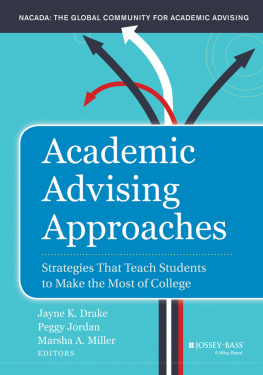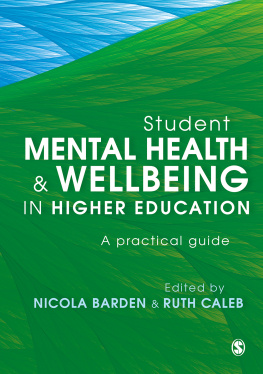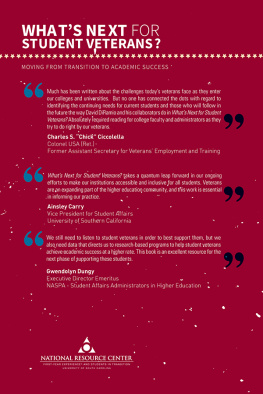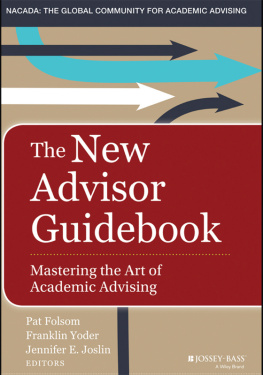
Table of Contents
Cover design by Michael Cook
Copyright 2013 by The National Academic Advising Association. All rights reserved.
Published by Jossey-Bass
A Wiley Brand
One Montgomery Street, Suite 1200, San Francisco, CA 94104-4594www.josseybass.com
No part of this publication may be reproduced, stored in a retrieval system, or transmitted in any form or by any means, electronic, mechanical, photocopying, recording, scanning, or otherwise, except as permitted under Section 107 or 108 of the 1976 United States Copyright Act, without either the prior written permission of the publisher, or authorization through payment of the appropriate per-copy fee to the Copyright Clearance Center, Inc., 222 Rosewood Drive, Danvers, MA 01923, 978-750-8400, fax 978-646-8600, or on the Web at www.copyright.com. Requests to the publisher for permission should be addressed to the Permissions Department, John Wiley & Sons, Inc., 111 River Street, Hoboken, NJ 07030, 201-748-6011, fax 201-748-6008, or online at www.wiley.com/go/permissions.
Limit of Liability/Disclaimer of Warranty: While the publisher and author have used their best efforts in preparing this book, they make no representations or warranties with respect to the accuracy or completeness of the contents of this book and specifically disclaim any implied warranties of merchantability or fitness for a particular purpose. No warranty may be created or extended by sales representatives or written sales materials. The advice and strategies contained herein may not be suitable for your situation. You should consult with a professional where appropriate. Neither the publisher nor author shall be liable for any loss of profit or any other commercial damages, including but not limited to special, incidental, consequential, or other damages. Readers should be aware that Internet Web sites offered as citations and/or sources for further information may have changed or disappeared between the time this was written and when it is read.
Jossey-Bass books and products are available through most bookstores. To contact Jossey-Bass directly call our Customer Care Department within the U.S. at 800-956-7739, outside the U.S. at 317-572-3986, or fax 317-572-4002.
Wiley publishes in a variety of print and electronic formats and by print-on-demand. Some material included with standard print versions of this book may not be included in e-books or in print-on-demand. If this book refers to media such as a CD or DVD that is not included in the version you purchased, you may download this material at http://booksupport.wiley.com. For more information about Wiley products, visit www.wiley.com.
Library of Congress Cataloging-in-Publication Data
Drake, Jayne K.
Academic advising approaches : strategies that teach students to make the most of college / Jayne K. Drake, Peggy Jordan, Marsha A. Miller. First edition.
pages cm
Includes bibliographical references and index.
ISBN 978-1-118-10092-9 (hardback); ISBN 978-1-118-41876-5 (ebk.); ISBN 978-1-118-41603-7 (ebk.)
1. Counseling in higher educationUnited StatesHandbooks, manuals, etc. 2. Faculty advisorsUnited StatesHandbooks, manuals, etc. I. Title.
LB2343.D73 2013
378.1'94dc23
2013013535
Good advising may be the single most underestimated characteristic of a successful college experience.
Richard Light, Making the Most of College: Students Speak Their Minds, 2001
This book is dedicated to academic advisors across the globe whose efforts help students make the most of their college experiences.
Preface
The publication of this book signals a significant step forward in the evolution of academic advising as a profession. Its purpose is to expand the knowledge base of advising and link theory with practice. It provides a deep look at the scholarship that underpins advising and offers practical applications for advising contact with students. It highlights the various interdisciplinary connections between advising and other disciplines, especially the social sciences, education, and the humanities. It also challenges professional and faculty advisors, counselors, personal tutors, and advising administrators around the world to become thought leaders and scholar-practitioners ( Schulenberg & Lindhorst, 2008, p. 43)those who study the knowledge base, engage in research, explore the viability and applicability of various theories to student interactions, and assess the practical applications to their own advising practice. As Shaffer, Zalewski, and Leveille (2010) stated in The Professionalization of Academic Advising, academic advisors need to develop a body of theory from which to educate future advisors (p. 73). Doing so, they maintain, is as critical to the future of the profession as is the need for empirical research into the effectiveness of academic advising practice (p. 73). Good practice is grounded in knowledge, research, and assessment.
To serve increasingly complex and diverse institutions of higher education around the world and their burgeoning diverse student populations, academic advising professionals need to understand that one unified theory of academic advising is neither possible nor necessary ( Hagen & Jordan, 2008, p. 19). They must be able to recognize various advising approaches and adapt them to their own student populations with the expectation of enhancing student satisfaction with their academic experiences and helping students articulate and achieve their academic goals and career aspirations.
The contributors to this book provide theoretical background and practical developmental approaches to advising around the understanding that students are learners who establish a partnership of responsibility with their advisors and who ultimately take charge of their own academic, personal, and professional progress. Building relationships and encouraging this holistic development of all students are key elements in all the described approaches.
Prescriptive Advising as the Foundation
In the years following the 1972 publication of Burns Crookston's A Developmental View of Academic Advising, in which he distinguishes between developmental and prescriptive practices, advisors have embraced a more student-centered, active-learning approach to the advising process. Attention turned from the necessity of a service orientationthe advisor as the repository and disseminator of knowledge on curricular requirements and other academic information about students' records and academic progressto the advisor as teacher, mentor, facilitator, guide. Prescriptive advising, Crookston (1972/1994/2009) wrote, may best be seen as a largely one-way process in which the student offers little to the process. It is hierarchical in nature, with the advisor in command of the knowledge and the advisement sessions; the advisee is passive and in receipt of advice (1972, p. 13). His guiding metaphor is of the advisor as doctor who examines patients and prescribes the medication that will make them better. In the prevailing literature, this do-as-I-say approach has increasingly fallen on hard times and sometimes contrasts unfavorably with student development theories and approaches; some have dismissed it as a viable option for advising students.
However, all student populations, whether comprising first-year, first-generation, international, at-risk, exploratory, or military veteran students, respond well to a more prescriptive approach when direct instruction is necessary and appropriate. Students are encouraged to view their advisors as expert information and advice givers: If you need to activate your PIN number, see your advisor. If you need to pick several electives, see your advisor. If you want to change your major, see your advisor. If your GPA has slipped, see your advisor.












